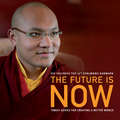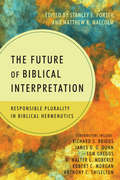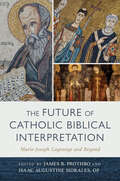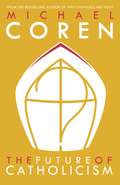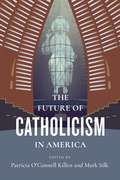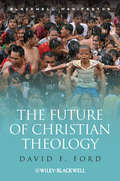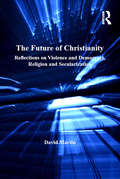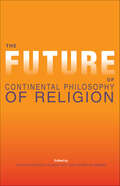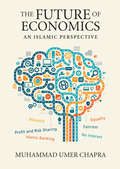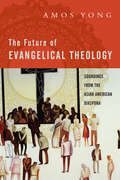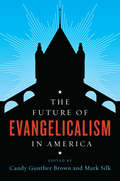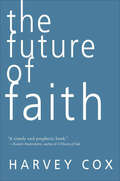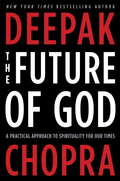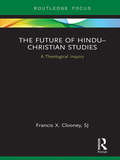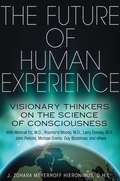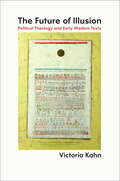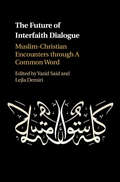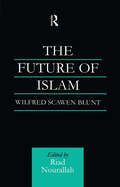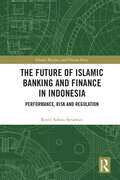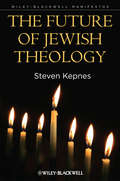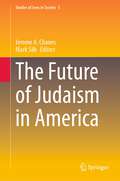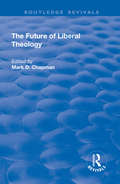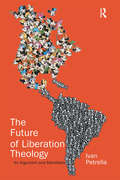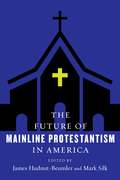- Table View
- List View
The Future is Now: Timely Advice For Creating A Better World
by Ogyen Trinley DorjeWith more than a million followers worldwide and at least 50,000 in the United States, the 17th Karmapa is one of Tibetan Buddhism’s most senior lamas. His dramatic escape from Tibet and his spiritual presence have made him an instant celebrity, and Elle magazine recently named him one of its "25 people to watch." The Future is Now, which pairs contemporary photography with 108 sayings on how to live more compassionately and consciously, is the Karmapa’s first mainstream work. In it, he offers advice on such universal and personal themes as social values, the environment, freedom, responsibility, loneliness, and contentment. Fresh, bold, timely photos and straightforward text make the ancient teachings of Buddhism accessible to everyone. Earlier this year, the Karmapa made his first trip to the West speaking to large crowds in New York, Boulder, and Seattle. It’s been reported that the venues sold out based almost solely on the strength of e-mail chains. His visit generated an enormous amount of publicity including two New York Times items, a piece in Time magazine, an interview on the PBS program "Religion & Ethics News Weekly," and coverage in major Buddhist magazines.
The Future of Biblical Interpretation: Responsible Plurality in Biblical Hermeneutics
by Matthew R. Malcolm Stanley E. PorterPreaching'sThe Future of Biblical Interpretation
The Future of Catholic Biblical Interpretation: Marie-Joseph Lagrange and Beyond
by Edited by James B. Prothro and Isaac Augustine Morales OPNotable Catholic interpreters of Scripture discern the guiding values of biblical interpretation at the brink of a new era for the church. Under the influence of Benedict XVI and Francis, Roman Catholics, whether lay or religious, have found renewed interest in studying sacred Scripture. Yet the church has also grown and faces new challenges in the new millennium. What does the future of Catholic biblical interpretation look like? And how ought the church&’s rich heritage of biblical interpretation continue to influence it? This volume collects essays by some of the most influential voices in Catholic biblical scholarship today. Covering a variety of topics, from the Old Testament to the New Testament and biblical theology, the essays are united by a common goal: to hear the word of God and proclaim and apply it within the church. The authors pay special tribute to Marie-Joseph Lagrange. This nineteenth-century French Dominican led the way in blending critical methodology with respect for the Church&’s authority in order to put scriptural study in service to the good of souls. Featuring diverse and authentically Catholic perspectives, The Future of Catholic Biblical Interpretation represents fresh purpose and direction for the church&’s long and fruitful tradition of exegesis.
The Future of Catholicism
by Michael CorenFrom the author of the bestselling Why Catholics Are Right, a perfectly timed book on the new Vatican -- where it is, where it needs to go, and why it is more relevant than ever.When Cardinal Jorge Mario Bergoglio, Archbishop of Buenos Aires, became Pope Francis in March 2013, there were almost 6,000 journalists in Rome to cover the Papal election. Some of them reported on the conclave with expertise and empathy, but others -- either out of ignorance or an agenda -- insisted on asking the same questions again and again: Is the Church going to change? Will the new Pope be flexible? Is Catholicism going to adapt to the times and alter its teaching on same-sex marriage, abortion, contraception, female ordination, celibate clergy, and divorce? Interestingly, these questions center on moral and sexual issues rather than directly theological topics, but they are all based on the premise that the Church is wrong, outdated, in need of fundamental transformation. Does the Church need to change, and if so, where? Where it cannot change, why is this so? In his signature frank style, Coren will explain and outline why the Church believes as it does on many of the most pressing moral issues, giving reasons for teaching and belief, and applying these to contemporary challenges. And for those areas where the Church must change and establish reform -- the transparency of leadership and finance; the competence of the curia and Vatican civil service; the approach the Church takes towards media, the way it deals with the detritus of the abuse crisis; and its approach to the developing world band towards others religions, particularly Islam -- Coren will offer insight into the faith's next steps.The Church is at a crossroads, but perhaps more significantly and accurately, the Western world is at a crossroads, and how the Church reacts to and deals with this phenomenon will decide and define so very much of the future -- of our future.
The Future of Catholicism in America (The Future of Religion in America)
by Mark Silk Killen Patricia O’ConnellCatholics constitute the largest religious community in the United States. Yet most American Catholics have never known a time when their church was not embroiled in controversies over liturgy, religious authority, cultural change, and gender and sexuality. Today, these arguments are taking place against the backdrop of Pope Francis’s progressive agenda and the resurgence of the clergy sexual abuse crisis. What is the future of Catholicism in America?This volume considers the prospects at a pivotal moment. Contributors—scholars from sociology, theology, religious studies, and history—look at the church’s evolving institutional structure, its increasing ethnic diversity, and its changing public presence. They explore the tensions among members of the hierarchy, between clergy and laity, and along lines of ethnicity, immigration status, class, generation, political affiliation, and degree of religious commitment. They conclude that American Catholicism’s future will be pluriform—reflecting the variety of cultural, political, ideological, and spiritual points of view that typify the multicultural, democratic society of which Catholics constitute so large a part.
The Future of Christian Theology (Wiley-Blackwell Manifestos #55)
by David F. FordThe Future of Christian Theology represents a personal manifesto from one of the world's leading theologians, exploring the ways Christian theology in the twenty-first century has been, and can now continue to be, both creative and wise. Represents an outstanding and engaging account of the task of theology today Offers an insightful description of what makes for discerning and creative theology. Written from the perspective of decades of experience, and in close dialogue with theologians of other faiths Features a strong interfaith and public theology dimension, and a contemporary portrait of the field from the inside A hopeful and illuminating search for wisdom and understanding in the increasingly complex religious and secular world of the twenty-first century.
The Future of Christianity: Reflections on Violence and Democracy, Religion and Secularization
by David MartinThis book offers a mature assessment of themes preoccupying David Martin over some fifty years, complementing his book On Secularization. Deploying secularisation as an omnibus word bringing many dimensions into play, Martin argues that the boundaries of the concept of secularisation must not be redefined simply to cover aberrant cases, as when the focus was more on America as an exception rather than on Europe as an exception to the 'furiously religious' character of the rest of the world. Particular themes of focus include the dialectic of Christianity and secularization, the relation of Christianity to multiple enlightenments and modes of modernity, the enigmas of East Germany and Eastern Europe, and the rise of the transnational religious voluntary association, including Pentecostalism, as that feeds into vast religious changes in the developing world. Doubts are cast on the idea that religion has ever been privatised and has lately reentered the public realm. The rest of the book deals with the relation of the Christian repertoire to the nexus of religion and politics, including democracy and violence and sharply criticises polemical assertions of a special relation of religion to violence, and explores the contributions of 'cognitive science' to the debate
The Future of Continental Philosophy of Religion (Philosophy Of Religion Ser.)
by Clayton CrockettWhat is the future of Continental philosophy of religion? These forward-looking essays address the new thinkers and movements that have gained prominence since the generation of Derrida, Deleuze, Foucault, and Levinas and how they will reshape Continental philosophy of religion in the years to come. They look at the ways concepts such as liberation, sovereignty, and post-colonialism have engaged this new generation with political theology and the new pathways of thought that have opened in the wake of speculative realism and recent findings in neuroscience and evolutionary psychology. Readers will discover new directions in this challenging and important area of philosophical inquiry.
The Future of Economics: An Islamic Perspective
by M. Umer ChapraThis profound book is a powerful yet balanced critique of mainstream economics that makes a forceful plea for taking economics out of its secular and occident-centred cocoon. It presents an innovative and formidable case to re-link economics with moral and egalitarian concerns so as to harness the discipline in the service of humanity.M. Umer Chapra is ranked amongst the Top 50 Global Leaders in Islamic economics (ISLAMICA 500, 2015) and has been awarded with two prestigious awards for his contributions to the field: Islamic Development Bank Award for Islamic Economics (1989) and the King Faisal International Prize for Islamic Studies (1989).
The Future of Evangelical Theology: Soundings from the Asian American Diaspora
by Amos YongThe Future of Evangelical Theologywhole
The Future of Evangelicalism in America
by Candy Gunther Brown Mark SilkEvangelicalism has, since the 1960s, outpaced mainline Protestantism to encompass more than a third of American adults and nearly half of all U.S. Christians. Thematic chapters on culture, spirituality, theology, politics, and ethnicity reveal sources of the movement's dynamism, as well as significant challenges confronting the rising generations. This collaborative undertaking by scholars of history, religious studies, theology, political science, and ethnic studies offers unique insight into a vibrant and sometimes controversial movement, the future of which is closely tied to the future of America itself.
The Future of Evangelicalism in America (The Future of Religion in America)
by Candy Gunther Brown Mark SilkIn The Future of Evangelicalism in America, thematic chapters on culture, spirituality, theology, politics, and ethnicity reveal the sources of the movement's dynamism, as well as significant challenges confronting the rising generations. A collaboration among scholars of history, religious studies, theology, political science, and ethnic studies, the volume offers unique insight into a vibrant and sometimes controversial movement, the future of which is closely tied to the future of America.
The Future of Faith
by Harvey Gallagher CoxLegendary Harvard religion scholar Harvey Cox offers up a new interpretation of the history and future of religion. Cox identifies three fundamental shifts over the last 2,000 years of church history: The Age of Faith was when the early church was more concerned with following Jesus' teachings than enforcing what to believe about Jesus. The Age of Belief marks a significant shift-between the fourth and twentieth centuries-when the church focused on orthodoxy and right beliefs. The Age of the Spirit, that began in the 1960s and is shaping not just Christianity but other religious traditions today, is ignoring dogma and breaking down barriers between different religions. Spirituality is replacing formal religion. Reflecting on how his own faith journey mirrors these three historical shifts, Cox personalizes the material in a compelling, practical ways. The Future of Faith is a major statement by one of the most revered theologians today.
The Future of God
by Deepak ChopraFrom the New York Times Bestselling Author. Can God be revived in a skeptical age? What would it take to give people a spiritual life more powerful than anything in the past? Deepak Chopra tackles these issues with eloquence and insight in this book. He proposes that God lies at the source of human awareness. Therefore, any person can find the God within that transforms everyday life. God is in trouble. The rise of the militant atheist movement spearheaded by Richard Dawkins signifies, to many, that the deity is an outmoded myth in the modern world. Deepak Chopra passionately disagrees, seeing the present moment as the perfect time for making spirituality what it really should be: reliable knowledge about higher reality. Outlining a path to God that turns unbelief into the first step of awakening, Deepak shows us that a crisis of faith is like the fire we must pass through on the way to power, truth, and love. "Faith must be saved for everyone's sake," he writes. "From faith springs a passion for the eternal, which is even stronger than love. Many of us have lost that passion or have never known it." In any age, faith is a cry from the heart. God is the higher consciousness that responds to the cry. "By itself, faith can't deliver God, but it does something more timely: It makes God possible." For three decades, Deepak Chopra has inspired millions with his profound writing and teaching. With The Future of God, he invites us on a journey of the spirit, providing a practical path to understanding God and our own place in the universe. Now, is a moment of reinvigoration, he argues. Now is moment of renewal. Now is the future.
The Future of Hindu–Christian Studies: A Theological Inquiry
by Francis X. ClooneyThe field of Hindu-Christian studies revives theology as a particularly useful interreligious discipline. Though a sub-division of the broader Hindu-Christian dialogue, it is also a distinct field of study, proper to a smaller group of religious intellectuals. At its best it envisions a two-sided, mutual conversation, grounded in scholars’ knowledge of their own tradition and of the other. Based on the Westcott-Teape Lectures given in India and at the University of Cambridge, this book explores the possibilities and problems attendant upon the field of Hindu-Christian Studies, the reasons for occasional flourishing and decline in such studies, and the fragile conditions under which the field can flourish in the 21st century. The chapters examine key instances of Christian–Hindu learning, highlighting the Jesuit engagement with Hinduism, the modern Hindu reception of Western thought, and certain advances in the study of religion that enhance intellectual cooperation. This book is a significant contribution to a sophisticated understanding of Christianity and Hinduism in relation. It presents a robust defense of comparative theology and of Hindu-Christian Studies as a necessarily theological discipline. It will be of wide interest in the fields of Religious Studies, Theology, Christianity and Hindu Studies.
The Future of Human Experience: Visionary Thinkers on the Science of Consciousness
by J. Zohara HieronimusExplores the future predictions of cutting-edge scientists, spiritual teachers, and other visionaries and how we can affect the future • Shares insights from the author’s discussions with Dr. Mehmet Oz, Raymond Moody, Larry Dossey, John Perkins, Michael Cremo, Gay Bradshaw, Ray Kurzweil, and many others • Examines what these visionary thinkers foresee for humanity based on current trends in medicine, science, agriculture, history, and other disciplines • Reveals how consciousness affects evolution and Earth’s future For almost three decades Zohara Hieronimus has interviewed spiritual teachers, cutting-edge scientists, ancient wisdom keepers, laboratory-tested psychics, and other visionaries on their predictions for the near and far future. While the methods they use are significantly diverse, the similarities in their forecasts are striking. And, as Hieronimus reveals, one common theme resonates through them all: the power of human consciousness. Sharing insights from her discussions with Dr. Mehmet Oz, Raymond Moody, Larry Dossey, John Perkins, Michael Cremo, Gay Bradshaw, Ray Kurzweil, and many others, Hieronimus explores what these visionary thinkers foresee for humanity based on current trends in medicine, science, agriculture, Earth history, robotics, and spirituality. She examines natural, extraterrestrial, and man-made events that dramatically altered humanity’s course in the past or might in the future, revealing a recurring cycle of catastrophic Earth changes and rebirths of civilization over billions of years. The author explains that, as part of the energetic expression of Divinity, we can influence the impact of Earth changes through our actions and intentions. She shows that the consciousness of humanity has the power to affect evolution, enact healing on personal and global levels, and alter even natural systems such as the weather. By studying predictions across a broad range of disciplines--from nano-technology to plant intelligence--from today’s great minds and from ancient spiritual traditions, Hieronimus shows that we can significantly improve the long-term welfare of the Earth by unfolding our nonlocal consciousness, adopting a reverent attitude toward all life, and realizing how we do things is as vital as what we do.
The Future of Illusion: Political Theology and Early Modern Texts
by Victoria KahnIn recent years, the rise of fundamentalism and a related turn to religion in the humanities have led to a powerful resurgence of interest in the problem of political theology. In a critique of this contemporary fascination with the theological underpinnings of modern politics, Victoria Kahn proposes a return to secularismOCowhose origins she locates in the art, literature, and political theory of the early modern periodOCoand argues in defense of literature and art as a force for secular liberal culture. aKahn draws on theorists such as Carl Schmitt, Leo Strauss, Walter Benjamin, and Hannah Arendt and their readings of Shakespeare, Hobbes, Machiavelli, and Spinoza to illustrate that the dialogue between these modern and early modern figures can help us rethink the contemporary problem of political theology. Twentieth-century critics, she shows, saw the early modern period as a break from the older form of political theology that entailed the theological legitimization of the state. Rather, the period signaled a new emphasis on a secular notion of human agency and a new preoccupation with the ways art and fiction intersected the terrain of religion. Reclaiming a role for the arts in contemporary debates about liberalism and political theology, a"The Future of Illusion"aarticulates a new defense of what Hans Blumenberg called OC the legitimacyOCO of our modern secular age. "
The Future of Interfaith Dialogue: Muslim-Christian Encounters through A Common Word
by Yazid Said Lejla DemiriA Common Word Between Us and You (ACW) is an open letter, dated 13 October 2007, from leaders of the Islamic religion to those of the Christian religion. It calls for peace between Muslims and Christians and seeks common ground and understanding between both religions. This volume examines the document from a number of perspectives. Exploring the events that led to ACW, it provides an overview of responses to the document and its use of scripture. It also relates the reception of ACW to several specific and contrasting contexts, and recommends new avenues for ACW-inspired discussion. Advancing debate and dialogue between Jews, Muslims and Christians, this volume promotes a distinctive methodology for inter-religious studies, and serves as an invaluable resource for students and scholars of theology and religious studies.
The Future of Islam: A New Edition
by Wilfred Scawen BluntWhen it first appeared in 1882, this book was a pioneering work in every respect. It was the first coherent study of 'modern' Islam, explaining in a simple and functional manner its tenets and roots, the diversity of its cultural and political experience, and its dynamism and potential for good in the modern world. This was at a time when the Muslim world was perceived by most people in the west as inert and spent, caught in an irredeemable malaise of its own making. Blunt's attitude, shaped by several factors and sharpened by personal knowledge of important parts of the Muslim world and close association with many leading reformers in it, was unprecedented and startling at the time. This new edition includes an Introduction and numerous footnotes, updating statistics, explaining the background to historical events and religious and political figures, and filling in gaps.
The Future of Islamic Banking and Finance in Indonesia: Performance, Risk and Regulation (Islamic Business and Finance Series)
by Romi Adetio SetiawanSharia-compliance is the raison d’etre of Islamic banks. All of their instruments and activities should be based on sharia principles, which unfortunately exposes them to greater risks than their conventional counterparts, regulated under the dual banking system in Indonesia. These include inconsistencies between fatwas, unique reputational risks, and inefficiencies in the regulatory framework governing Islamic banks. This book critically examines the less-studied issue of developing an Islamic banking regulatory and supervisory framework that considers the risk pressures faced by Islamic banks’ operations in an Indonesian financial sector dominated by conventional banks. The book assesses the extent to which the global financial standards of the Basel Accords have been followed by Islamic Banks in Indonesia, with respect to their regulation, supervision, and risk management, to highlight the unresolved tensions in the multiple regulatory and supervisory institutions. The book proposes a middle-ground approach that accommodates modification of the existing financial regulatory and supervisory system in line with international best practice. The reforms proposed in this book offer a way for financial regulatory and supervisory agencies to further develop modern Islamic law and finance. The book will be a valuable resource for scholars and policymakers interested in the dual banking system in Indonesia.
The Future of Jewish Theology (Wiley-Blackwell Manifestos)
by Steven KepnesThis engaging argument for the future of Jewish theology, written by a renowned Jewish scholar, provides a rounded introduction to the faith, its history, and its place in the modern world. Explores foundational Jewish structures and concepts through the discussion and interpretation of Jewish texts Argues that we must acknowledge holiness as a ritual and ethical reality in order to heal the rift between different forms of Jewish practice and theology Covers historical context as well as the relations between Judaism, Israel and the wider world today Speaks to both Jews and non-Jews and demonstrates through textual readings how Jews, Christians, and Muslims can understand and share their theological riches
The Future of Judaism in America (Studies of Jews in Society #5)
by Mark Silk Jerome A. ChanesThis book explores the state of the American Jewish world in the early 21st century, after decades of accelerating change that has transformed it and all other religious groups in the United States. It reveals a community in an unparalleled state of flux grappling with a society in which religious identity is more and more considered an individual choice, rather than an inheritance, and where fewer adults feel impelled to identify with any religious tradition at all. In chapters written by leading experts, the book examines the community’s evolving demographics, the direction of the principal denominational movements, contemporary religious trends, interactions with other American religious communities and engagements in the country’s secular politics. This text uniquely covers all these aspects of Judaism in America making it appealing to students and researchers in such fields as the sociology of religion, Judaism, and American history.
The Future of Liberal Theology
by Mark D. ChapmanThis title was first published in 2002: Two hundred years after the publication of Schleiermacher's epoch-making Speeches, The Future of Liberal Theology presents a comprehensive and critical re-assessment of the past, present and future of the liberal tradition in Christian theology. In dialogue with the different forms of liberalism emerging from the Enlightenment, each of which is carefully defined, distinguished international theologians draw on a range of perspectives which represent the diversity of liberal theology. Discussing the criticisms of liberalism offered in the twentieth century, and engaging with contemporary theological debate which is often deeply hostile to liberalism, the conclusions offered for liberal theology range from the deeply pessimistic to the thoroughly optimistic. Students, clergy, and theological educators more broadly will value this critical reflection on the current state of theology and suggestions for its future course, together with the serious engagement with issues in theological education, which this book presents.
The Future of Liberation Theology: An Argument and Manifesto
by Ivan PetrellaThe Future of Liberation Theology envisions a radical new direction for Latin American liberation theology. One of a new generation of Latin American theologians, Ivan Petrella shows that despite the current dominance of 'end of history' ideology, liberation theologians need not abandon their belief that the theological rereading of Christianity must be linked to the development of 'historical projects' - models of political and economic organization that would replace an unjust status quo. In the absence of historical projects, liberation theology currently finds itself unable to move beyond merely talking about liberation toward actually enacting it in society. Providing a bold new interpretation of the current state and potential future of liberation theology, Ivan Petrella brings together original research on the movement, with developments in political theory, critical legal theory and political economy to reconstruct liberation theology's understanding of theology, democracy and capitalism. The result is the recovery of historical projects, thus allowing liberation theologians to once again place the reality of liberation, and not just the promise, at the forefront of their task.
The Future of Mainline Protestantism in America (The Future of Religion in America)
by Mark Silk Edited by James Hudnut-BeumlerAs recently as the 1960s, more than half of all American adults belonged to just a handful of mainline Protestant denominations—Presbyterian, UCC, Disciples of Christ, Episcopal, Lutheran, Methodist, and American Baptist. Presidents, congressmen, judges, business leaders, and other members of the elite overwhelmingly came from such backgrounds. But by 2010, fewer than 13 percent of adults belonged to a mainline Protestant church. What does the twenty-first century hold for this once-hegemonic religious group?In this volume, experts in American religious history and the sociology of religion examine the extraordinary decline of mainline Protestantism over the past half century and assess its future. Contributors discuss the demographics of mainline Protestants; their beliefs, practices, and modes of worship; their political views and partisan affiliations; and the social and moral questions that unite and divide Protestant communities. Other chapters examine Protestant institutions, including providers of health care and education; analyze churches’ public voice; and probe what will come from a diminished role relative to other groups in society, especially the ascendant evangelicals. Far from going extinct, the book argues, the mainline Protestant movement will continue to be a vital remnant in an American religious culture torn between the contending forces of secularism and evangelicalism.
